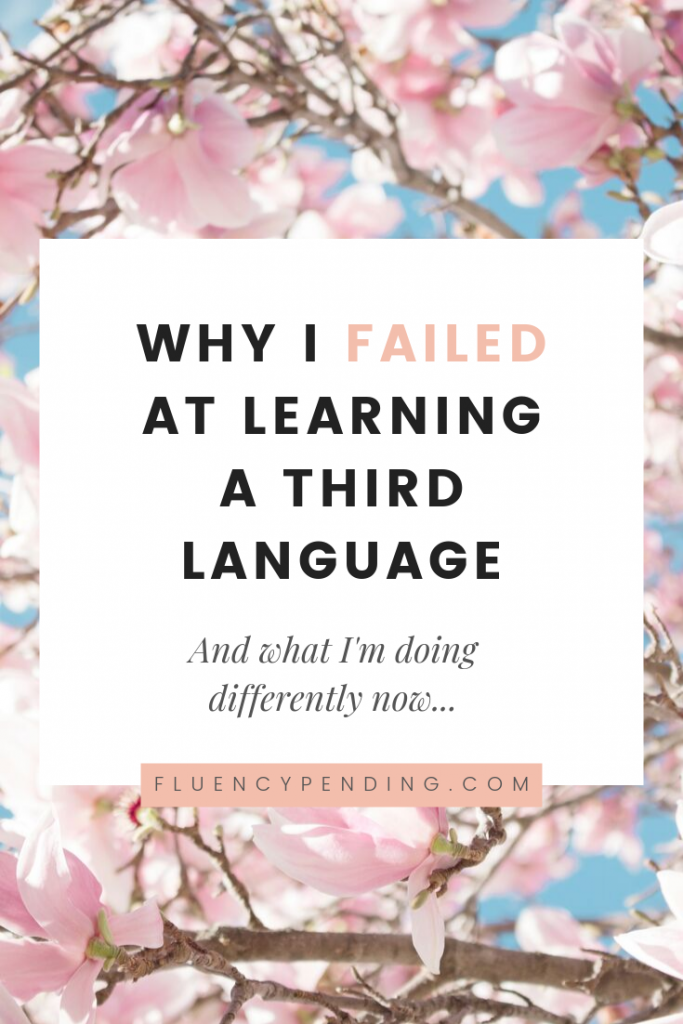
Why I failed miserably at learning a third language (and what I’m doing better this time around)
In the South African province where I grew up, isiXhosa was (and probably still is) a mandatory school subject from Grade 3 to Grade 7. I chose to continue with isiXhosa as a third language until Grade 12 and even took it as an ‘easy A’ first year elective at university.
With 11 years of formal isiXhosa classes under my belt, you’d think that I would at least be conversational, if not fluent. Nope. Think again. To my shame, I still cannot string a sentence together.
Here’s what went wrong and what I’m doing differently now that I am seriously focused on learning Mandarin.
Rookie mistake #1: I didn’t speak
Despite having about 8.3 million native speakers eager for conversation right in my backyard, I never really spoke to anyone except my teacher and a few close friends. To be fair to myself, I was a shy teenager who didn’t like to communicate in my native language or English, let alone a third language filled with difficult-to-pronounce clicks.
Still, I had a huge advantage over someone trying to learn a foreign language in a country where that language is not widely spoken. I am starting to realise just what a privilege it was to be surrounded by native speakers now that I am trying to learn Mandarin.
What I’m doing differently
I try to force myself to speak whenever I encounter an unsuspecting Mandarin speaker. I compliment the lady at the checkout at my local Chinese supermarket on her outfits. I have stilted conversations with my Chinese teacher whenever we get together. I tried talking to the cashier at my local Chinese takeout joint until she very tactfully informed me that she, in fact, only speaks Cantonese.
It’s awkward. I butcher my tones. I forget words that I learned years ago. I suspect the entire Chinese community in my neighbourhood thinks I am an incomprehensible madwoman. But I power through because why bother to learn a language if you are not going to speak it, right?
Rookie mistake #2: I was too focused on passing exams
My high school certificate, if anyone cared enough to look, shows that I am an excellent language learner with As in three languages.
The truth is, it’s easy to game the system if you are good at taking exams. Exams are not a good test of true language ability. They really only test how well you can reproduce a very rigidly curated set of information in a familiar, predictable way.
In my Mandarin studies, I often come across stories on various forums about learners who passed the HSK 6 exam with a high score but still cannot hold down a conversation. These accounts may be purely anecdotal, but it was enough to give me pause before pouring all my energy into exam preparation.
What I’m doing differently
At the moment, I am casually working through the HSK 6 curriculum with no real goal of sitting the exam. I find it useful as a foundation, but I don’t want to divert attention away from other, I believe more useful, activities such as reading novels, listening to podcasts, watching dramas and speaking.
Of course, it really depends on your goals and learning style. If you need to pass a certain exam to, say, gain entry into a university course, exam preparation is unavoidable. Some learners also prefer having a structured curriculum and a tangible goal to work towards. A looming exam can be a great motivator to hit the books. However, it should never stand in the way of any real learning.
Rookie mistake #3: I couldn’t overcome my biggest hurdle
Every language has a ‘big bad’. You know, that one thing that makes you break out into a cold sweat just thinking about it. For me, it was the clicks in isiXhosa. I spent years trying to figure out where my tongue should go and eventually tired of the verbal gymnastics and gave up speaking altogether.
What I’m doing differently
With Mandarin, I’m facing the ‘big bad’ head-on instead of ignoring it in the hopes that it will just magically click (that’s a terrible pun, sorry) one day. I’ve zeroed in on my weak spot (the dreaded tones) and put together a strategy for managing and perhaps one day conquering this particular demon. It’s a work in progress, but progress is progress.
Rookie mistake #4: I fell into the trap of being overly-praised
I love that people are so eager to heap on the praise when a foreigner speaks a few words of their native language. People are great, but unwarranted praise is really not that helpful to language learners.
I learned very quickly that being able to say a few words in isiXhosa gives you the same positive feedback as being fluent. So, why bother to learn more, especially if you can make yourself understood in English when absolutely necessary?
What I’m doing differently
Whenever someone says ‘Your Chinese is really great!’, I take it with a pinch of salt. I know it isn’t that great. People are just nice. When pushed a little, they’ll usually gently point out your errors. I don’t put people on the spot or treat every conversation as a freebie language lesson, but I do make it clear I can stand a bit of constructive criticism.
Rookie mistake #5: I didn’t keep it up
This one is a bit of a no-brainer. Language learning really is a ‘use it or lose it’ game. High school was a long, long time ago and I haven’t used isiXhosa in any real sense in ages, so it’s really no wonder that I cannot speak it very well. I am hoping to pick it up again soon!
What I’m doing differently
I’ve made language learning a part of my daily routine. Even on very busy days, I make a point of spending a few minutes on a Memrise session, reading a paragraph of a book or whatever activity I can squeeze into those idle minutes of the day.
In part, this blog is also an exercise in accountability. A public declaration of my intention to continue to improve my Mandarin. Feel free to call me out on it if it seems like I am slacking!
Have you ever failed at learning a language? What would you do differently if you had a second chance at it?






1 Comments
KONTOL KUDA
May 3, 2020 at 5:35 pm
I like the valuable information you provide for your articles.
I will bookmark your blog and take a look at once more right here regularly.
I am somewhat sure I’ll learn lots of new stuff right right
here! Best of luck for the next!
Comments are closed